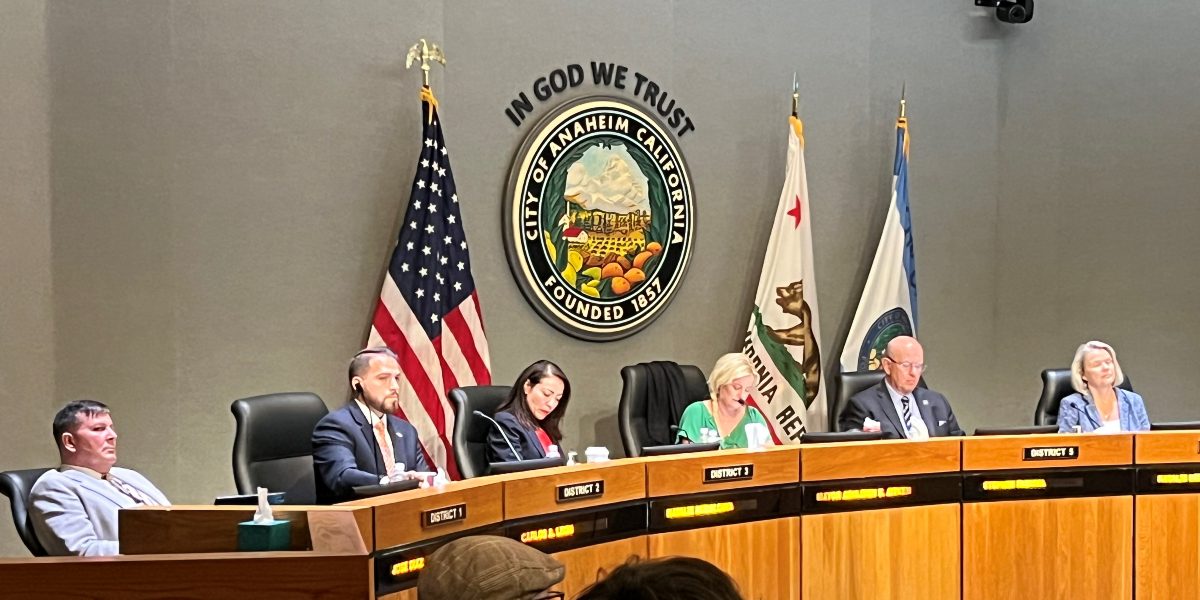The Anaheim City Council voted to oppose Measure A, a Los Angeles-style ballot measure that would impose a destructive regime of huge wage increases and onerous work restrictions on all Anaheim hotels and event centers – including city-owned facilities such as the Anaheim Convention Center, the Honda Center, and Angel Stadium.
If passed, Measure A would cost the Anaheim city budget $90 million over ten years in lost tax revenue and increases labor costs, according to experts who have studied the matter – including city Finance Director Debbie Moreno.
The council adopted an official resolution of opposition to Measure A, which is sponsored by UNITE-HERE Local 11, the militant hotel workers union currently conducting a disruptive rolling strike in Anaheim and throughout Los Angeles and Orange counties.
The council cited as reasons depressed tax revenues, increased labor costs, the potential destruction of numerous small and family businesses, and undermining Anaheim’s competitiveness as a convention destination if Measure A were to pass.
Anaheim has more than 160 hotels, most of which are independently owned and operated. Many of them have been family-owned for generations. Measure A’s definition of an “event center” is so broad that it applies to venues as varied as the Anaheim Convention Center, the Anaheim YMCA, and Camelot Golfland.
If Measure A passed, affected businesses would have only 10 days to increase their minimum wage to $25 an hour and implement work rules that severely limit how many square feet of room space hotel workers could clean before that wage doubles to $50.
For many smaller hotels and event centers, the UNITE-HERE Local 11 measure would lead to layoffs, reduced employee benefits, or even closure.
The sheer breadth and costliness of UNITE-HERE Local 11’s ballot initiative has galvanized a broad coalition of small and large businesses and their employees, residents, and community leaders in opposition. This coalition has accomplished the unique feat of out-mobilizing and out-organizing UNITE-HERE Local 11, filling the chambers during council meetings to educate the city council on how Measure A will devastate their businesses and jobs, and undercut the city’s ability to fund public services.
The coalition has managed to raise more than $1 million in less than two months to educate voters on Measure A’s impacts.
Several members of the anti-Measure A coalition spoke at last night’s meeting to urge the council to oppose Measure A. UNITE-HERE Local 11 was AWOL – not a single representative was on hand.
The council voted 5-0-2 to oppose Measure A. Mayor Ashleigh Aitken and Councilman Carlos Leon both voiced their opposition to the city taking a stand on the matter and abstained from voting. In May, both Aitken and Leon had voted to immediately adopt Measure A without studying what impacts that action would have on the city’s budget and future tax revenues and labor costs.
The rest of the council were straightforward in voicing their opposition.
“This special interest proposal is extremely risky and should be rejected by Anaheim voters,” said Councilmember Jose Diaz, who represents District 1 in west Anaheim. “Measure A will jeopardize critical quality of life services throughout the city.”
“I think that it’s important for the council to weigh in on this. It’s a critical issue to the future of the city and our economics,” said District 6 Councilmember Natalie Meeks, who originally requested that the city officially oppose Measure A. “It’s about the people. It’s not just about the businesses. I ran on putting safety first in our community, quality of life and really protecting our neighborhoods. And we can’t do that if our revenues decline and we lose our significant revenue base.”
“The Resort is where a lot of our revenue comes from. It allows us to do great things in this city,” said Meeks. “And I think that the studies have shown – independent studies obtained by the city – show that [Measure A] has a huge impact.”
Mayor Pro Tem Natalie Rubalcava, who represents District 3, also spoke to severe budgetary impacts in addition to negative affects on businesses.
“It has a major impact on community services and to other resources that the city might need,” said Rubalcava. “In addition to the impact it would have on local businesses, it really does impact the day-to-day operation of the city as well.”
“It’s our responsibility to make informed decisions on behalf of the residents and to provide them with as much information as possible. And I really do feel that this resolution is doing that,” said Rubalcava. “And for us not to take at least some direction to provide people who are going to be voting in October on this issue, I think would be irresponsible.”
Rubalcava also noted Measure A would force the city to create a large, permanent, and expensive enforcement agency to police business compliance with its mandates.
District 4 Councilmember Norma Campos Kurtz said Measure A was an unwarranted intrusion by government into business and threatened the city’s ability to adequately public services.
“Adding services for our seniors has been the heart of my work here,” said Kurtz. “My dream is to have a stand-alone Senior Center and that’ll never happen if we start losing money in the city.”
“I also have a fundamental belief that government, whatever the level, federal, state and local in this case – while it needs to ensure the safety of the workers in the jurisdiction as we’ve done with a panic button,” said Kurtz, but cautioned government should refrain from telling businesses how to run their businesses.


